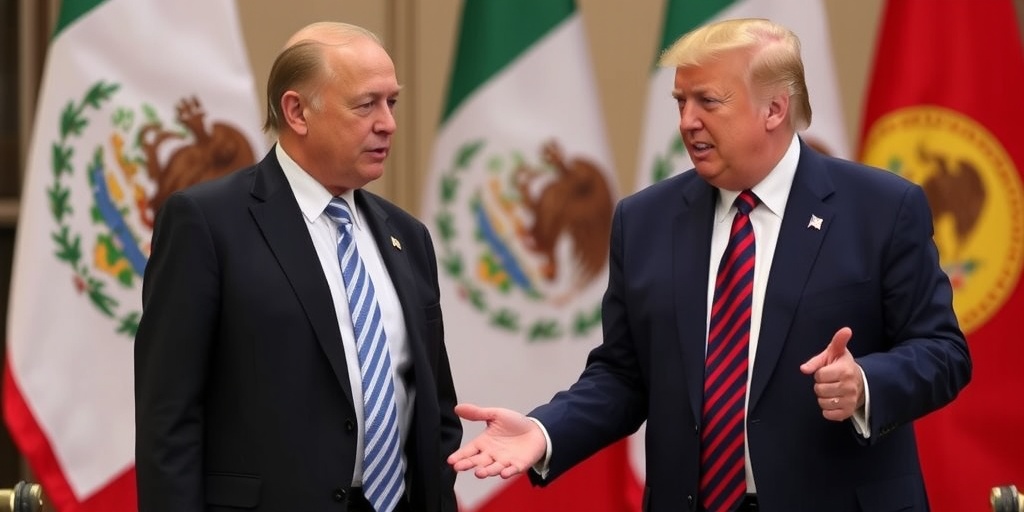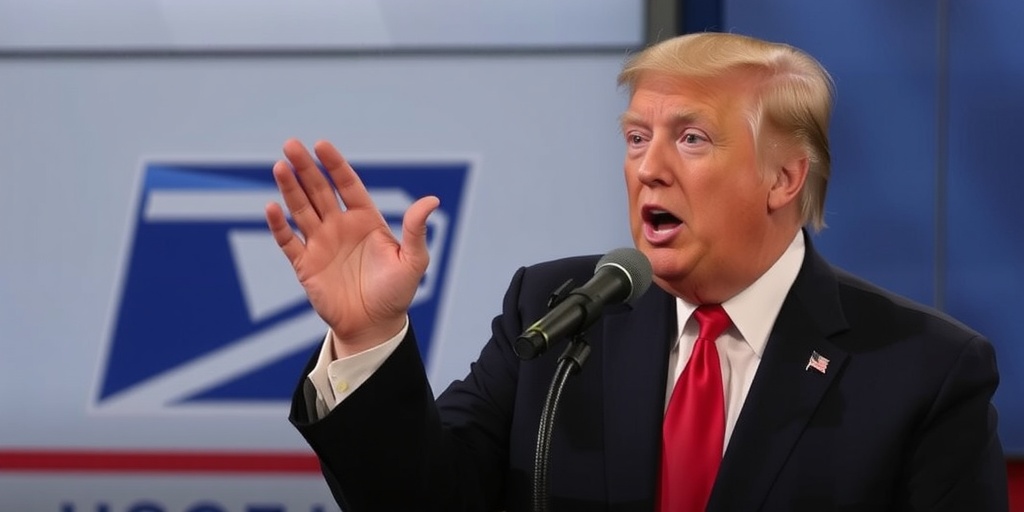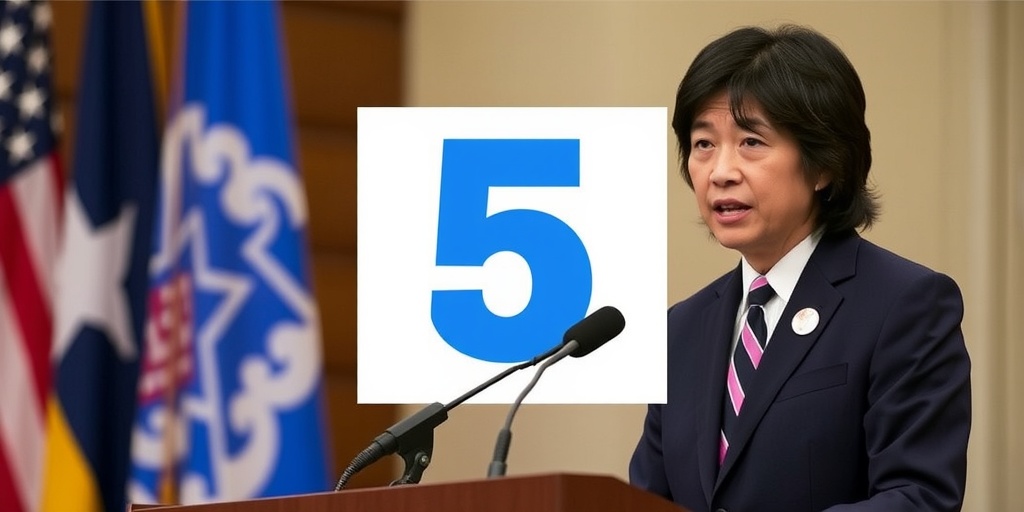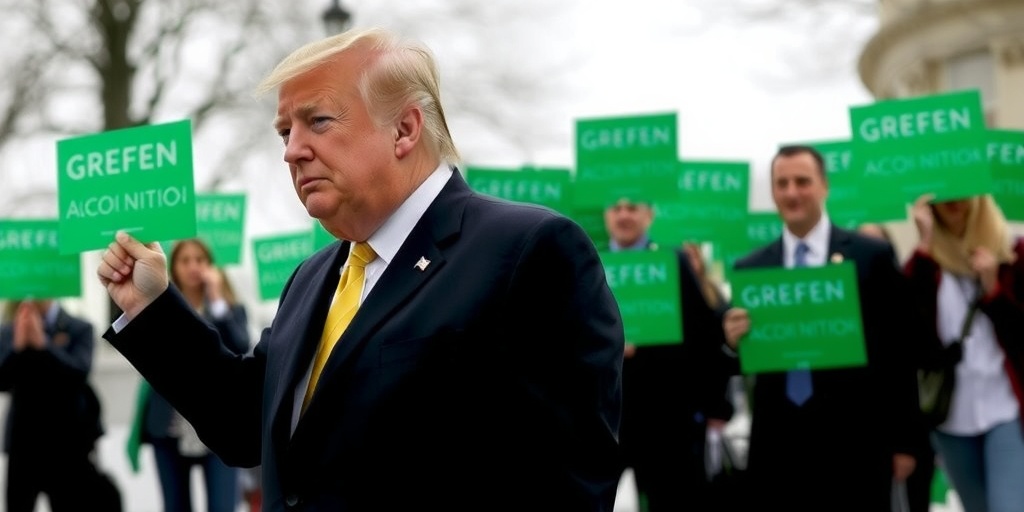Now Reading: Mexico Concedes to Trump but Still Faces Tariffs
-
01
Mexico Concedes to Trump but Still Faces Tariffs
Mexico Concedes to Trump but Still Faces Tariffs

Mexico’s Reaction to Trump’s Tariffs: A Delicate Balancing Act
In the wake of President Trump’s recent decision to impose tariffs on imports from Mexico, the Mexican government finds itself at a pivotal crossroads. Facing the prospect of severe tariffs shortly after Trump took office, Mexico made significant political and operational moves to comply with his demands, aiming to mitigate the impending economic repercussions.
Almost immediately, the Mexican government took steps to secure its northern border, implementing measures that drastically reduced the migration flow into the United States. Concurrently, they intensified their efforts against drug cartels in regions known for illicit fentanyl production. In an unprecedented initiative, Mexico even handed over 29 notorious drug lords to U.S. authorities last week, a gesture that was expected to demonstrate their commitment to combatting drug trafficking.
Nevertheless, despite Mexico’s actions, Trump moved forward with the previously threatened tariffs, which are currently set at 25 percent for most imports from both Mexico and Canada. This announcement sent shockwaves through global markets and left officials on both sides questioning the ultimate goal behind Trump’s strategy. Many speculate about whether the tariffs were primarily aimed at generating revenue for the U.S., or if they signify a broader attempt to reshape the global order and assert U.S. dominance on the world stage.
Some observers point out that Trump views trade deficits as a crisis and appears determined to follow through on his long-standing threats against Mexico. By enforcing these tariffs, it is believed he wants to project an image of toughness to other world leaders as he navigates foreign policy challenges in regions like Gaza and Ukraine.
After initially announcing the tariffs in early February, Trump postponed their implementation, granting Mexico and Canada a 30-day extension to demonstrate tangible results. However, when the tariffs were finally unveiled, the White House cited Mexico’s insufficient action in addressing the flow of drugs into the U.S., criticizing the country’s deep-rooted cartel connections and their relationship with the Mexican government. This comment led to speculation that Trump wants Mexico to intensify its efforts against political corruption within its ranks.
Security analysts in Mexico expressed frustration, indicating that Mexico has reached its limits in terms of what it can offer to prevent tariffs while questioning what more could be done regarding security issues. Similarly, American officials who have long worked on drug cartel-related issues voiced concerns that the tariffs could potentially hinder future collaborations with Mexico on security matters, showcasing the growing frustration over the lack of clarity surrounding Trump’s demands.
Even within Trump’s administration, there seems to be an acknowledgment that further tariff imposition might exhaust Mexico’s willingness to cooperate, potentially shutting down avenues for future collaboration. However, internal dissent regarding the tariffs appears to have diminished compared to the robust disagreements present during Trump’s first term.
The complexities of these tariffs were underscored by high-level talks last week in Washington between Mexican officials and senior U.S. representatives aimed at solidifying a security agreement. Mexico’s representatives aimed to convince the U.S. of their commitment to collaborating on cartel crackdowns and curbing drug trafficking into the U.S.
In a dramatic turn of events, just before the Mexican delegation’s departure from Washington, officials announced a major move to hand over a significant number of cartel leaders to the U.S. This action was a culmination of negotiations that began under the previous administration and highlighted Mexico’s willingness to act, even as they hurriedly navigated diplomatic channels.
The figures handed over included influential cartel leaders such as Rafael Caro Quintero and Miguel Ángel Treviño Morales, notorious for their violent reigns in the drug trade. This development, viewed as a substantial concession, was seen as Mexico’s earnest effort to quell U.S. concerns and avert the looming tariffs.
In light of these efforts, the Mexican government ramped up military operations in Sinaloa state, a key area in the production of fentanyl. The intensified enforcement, including the deployment of 10,000 National Guard troops at the border, has reportedly resulted in a noticeable decline in illegal crossings, reported to be the lowest rate in over 15 years.
Following the tariff announcement, there was widespread shock in Mexico, yet experts suggest that despite feeling unjustly punished, Mexican officials, led by President Claudia Sheinbaum, are unlikely to disengage from security collaboration with the U.S. The stakes are too high, as Sheinbaum understands that any deterioration in the bilateral relationship could spell disaster for her administration.
As both countries navigate this intricate situation, the ultimate motivations behind Trump’s tariffs remain shrouded in ambiguity, leaving Mexican officials and citizens grappling with uncertainty about future U.S.-Mexico relations.
Stay Informed With the Latest & Most Important News
Previous Post
Next Post
-
 01New technology breakthrough has everyone talking right now
01New technology breakthrough has everyone talking right now -
 02Unbelievable life hack everyone needs to try today
02Unbelievable life hack everyone needs to try today -
 03Fascinating discovery found buried deep beneath the ocean
03Fascinating discovery found buried deep beneath the ocean -
 04Man invents genius device that solves everyday problems
04Man invents genius device that solves everyday problems -
 05Shocking discovery that changes what we know forever
05Shocking discovery that changes what we know forever -
 06Internet goes wild over celebrity’s unexpected fashion choice
06Internet goes wild over celebrity’s unexpected fashion choice -
 07Rare animal sighting stuns scientists and wildlife lovers
07Rare animal sighting stuns scientists and wildlife lovers





















